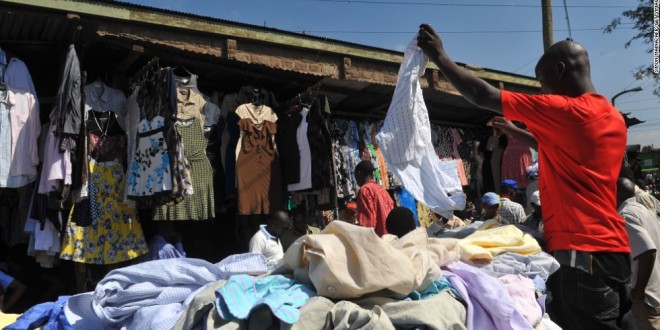
THE ban on second-hand clothes by the government is yet another signal that President Robert Mugabe’s administration has run out of ideas to resuscitate the ailing economy.
The Standard Editorial
Finance minister Patrick Chinamasa announced the ban on Thursday while presenting his mid-term policy statement reviewing the 2015 National Budget in Parliament as part of measures to protect the textile industry.
“I move to remove second-hand clothing and shoes from the open general import licence and any future importation of second-hand clothing and shoes will be liable to forfeiture and seizure,” he said.
With these words, Chinamasa might have pleased Priscilla Misihairabwi-Mushonga who was agitating for a ban on used underwear, but he dealt a serious blow to millions of Zimbabweans who get decent clothing from the bales imported, mainly through the Mozambican border.
The sale of second-hand clothes not only guarantees hard up Zimbabweans decent clothing, but also offers an opportunity for thousands of unemployed people who sell the merchandise. Banning the trade would leave many without clothing and traders without a source of income.
The country no longer has any textile industry to talk about and it would be foolhardy for Chinamasa to believe that this move, which will spawn the black market for second-hand clothing, could benefit any local company.
Just how does one hope to resuscitate a dead industry without providing funding and an enabling environment for businesses to operate?
- Chamisa under fire over US$120K donation
- Mavhunga puts DeMbare into Chibuku quarterfinals
- Pension funds bet on Cabora Bassa oilfields
- Councils defy govt fire tender directive
Keep Reading
The ban on second-hand clothes is like rubbing salt to an injury considering how the loss of jobs in the country has been worsened by the Supreme Court ruling that has made it easy for employers to terminate employees’ contracts. For those who unexpectedly woke up to find themselves without jobs, trading in second-hand clothes would have come in as an alternative.
If the ban is enforced religiously, it will not be surprising to see what used to be a common feature years ago in the rural areas — grown up men and women moving around in patched up clothes and poor children’s bare buttocks showing.
One wonders why a poor nation like Zimbabwe would ban trade in second-hand clothes when developed countries have thrift shops for used clothing and other items.
We suspect Chinese clothing stores in town, which are being shunned for their poor quality clothes, stand to benefit from this ban.
If our government cares in the least about the welfare of its people, it should revise its ban on second-hand clothes until a time when the local textile industry is up and running and is able to produce affordable clothing for all Zimbabweans.











